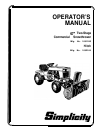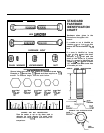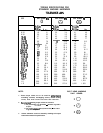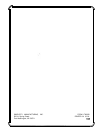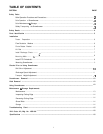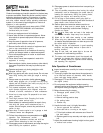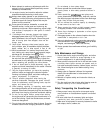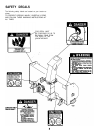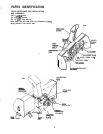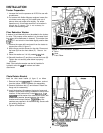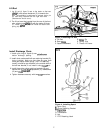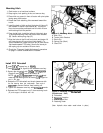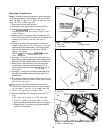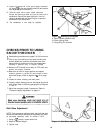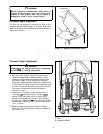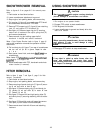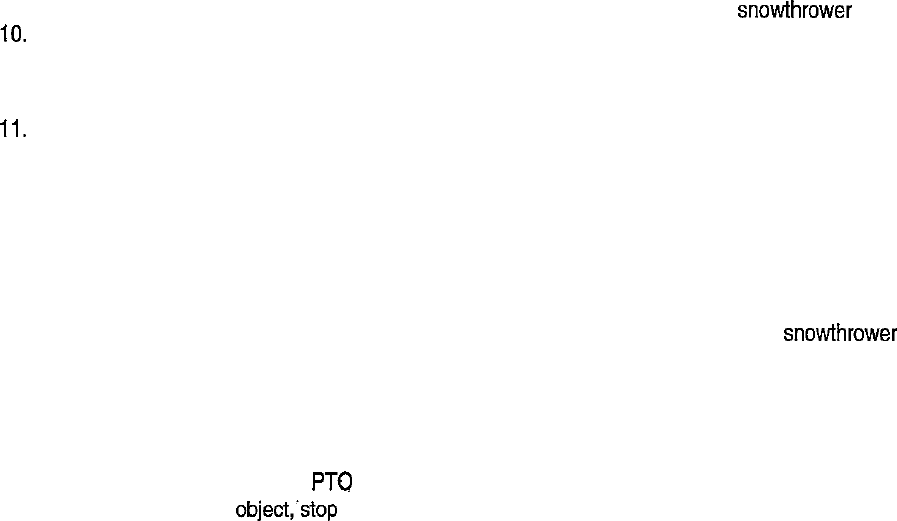
8. Never attempt to make any adjustments while the
engine is running (except when specifically recom-
mended by manufacturer).
9. Let engine (motor) and machine adjust to outdoor
temperatures before starting to clear snow.
10.
Always wear safety glasses or eye shields during
operation or while performing an adjustment or repair
to protect eyes from foreign objects that may be
thrown from the machine.
Il.
Cross gravel driveways, sidewalks, or roads with
extreme caution. Loose sand and rocks may be
picked up and thrown. Before operating, adjust height
of skid shoes (if equipped) to clear gravel or crushed
rock surfaces.
12. If discharge chute becomes clogged, stop tractor,
disengage power take-off (PTO) by pulling PTO
switch downward, shut off engine, remove key and
after all moving parts have stopped, clean out dis-
charge chute.
13. Never direct discharge chute toward people, espe-
cially children, pets, or breakable objects (windows,
shrubs, vehicles, etc.) or allow anyone in front of unit.
14. While snowthrower is in motion, keep hands, face,
hair, clothing, etc. away from all moving parts (auger,
discharge fan, discharge chute,
PTD
shaft).
15. After striking a foreign
object,‘stop
the engine, remove
the wire from the spark plug, thoroughly inspect the
snowthrower for any damage, and repair the damage
before restarting and operating the snow thrower.
16. If the unit should start to vibrate abnormally, stop the
engine and check immediately for the cause. Vibration
is generally a warning of trouble.
17. Stop the engine whenever you leave the operating
position, before unclogging the collector/impeller
housing or discharge guide, and when making any
repairs, adjustments, or inspections.
18. Take all possible precautions when leaving the
machines unattended. Disengage the power
takeoff,
lower
the attachment, set the parking brake, stop the
engine, and remove the key.
19. When cleaning, repairing, or inspecting, make certain
the collector/impeller and all moving parts have
stopped. Disconnect the spark plug wire and keep the
wire away from the plug to prevent accidental starting.
20. Do not run the engine indoors, except when starting
the engine and for transporting the snowthrower in or
out of the building. Open the outside doors; exhaust
fumes are dangerous.
21. Do not clear snow across the face of slopes. Exercise
extreme caution when changing direction on slopes.
Do not attempt to clear steep slopes.
22. Never operate the snowthrower without proper
guards, plates, or other safety protective devices in
place.
23. Never operate the
snowthrower
near glass enclo-
sures, automobiles, window wells, drop-offs, and the
like without proper adjustment of the snow discharge
angle. Keep children and pets away.
24. Do not overload the machine capacity by attempting
to clear snow at too fast a rate.
25. Never operate the machine at high transport speeds
on slippery surfaces. Use care when backing.
26. Never direct discharge at bystanders or allow anyone
in front of the unit.
27. Disengage power to the collector/impeller when the
snowthrower is transported or not in use.
28. Use only attachments and accessories approved by
the manufacturer of the snowthrower (such as wheel
weights, counterweights, cabs, and the like).
29. Never operate the snowthrower without good visibility
or light.
Safe Maintenance and Storage
1. Check shear bolts, engine mounting bolts, and other
bolts at frequent intervals for proper tightness to be
sure the equipment is in safe working condition.
2. Never store the tractor with fuel in the fuel tank inside
a building where ignition sources are present such as
hot water and space heaters, clothes dryers, and the
like. Allow the engine to cool before storing in any
enclosure.
3. Always refer to Operator’s Manual for important
details if the snowthrower is to be stored for an
extended period.
4. Maintain or replace safety and instruction labels, as
necessary.
5. Run the machine a few minutes after blowing snow to
prevent freeze-up of the collector/impeller.
Safely Transporting the Snowthrower
1. Always use a heavy-duty trailer to transport equip-
ment, whether or not attachment system is mounted
to tractor.
2. Be sure trailer has all necessary lights and signs
required by local, state, provincial or federal laws.
3. Make sure all equipment is securely fastened to trailer
with straps, chains, cables, etc.
3



